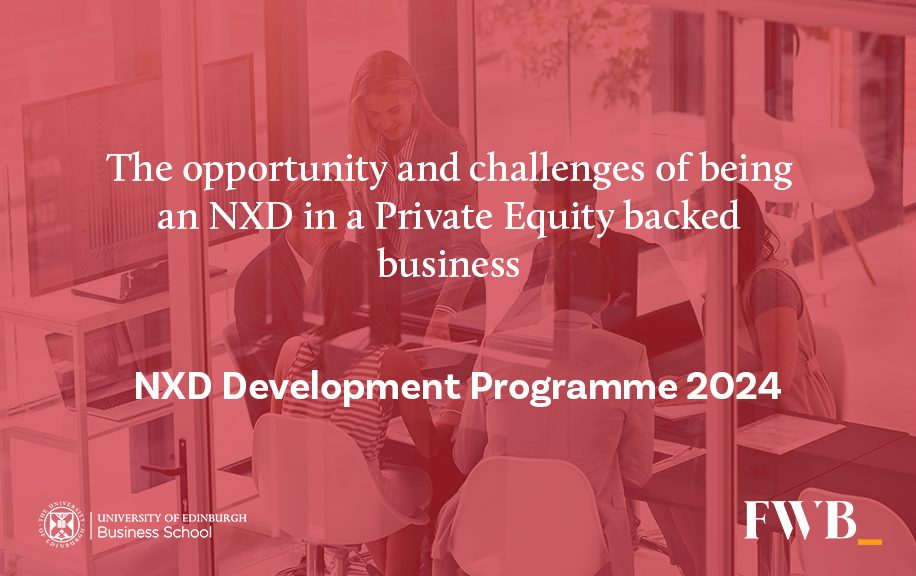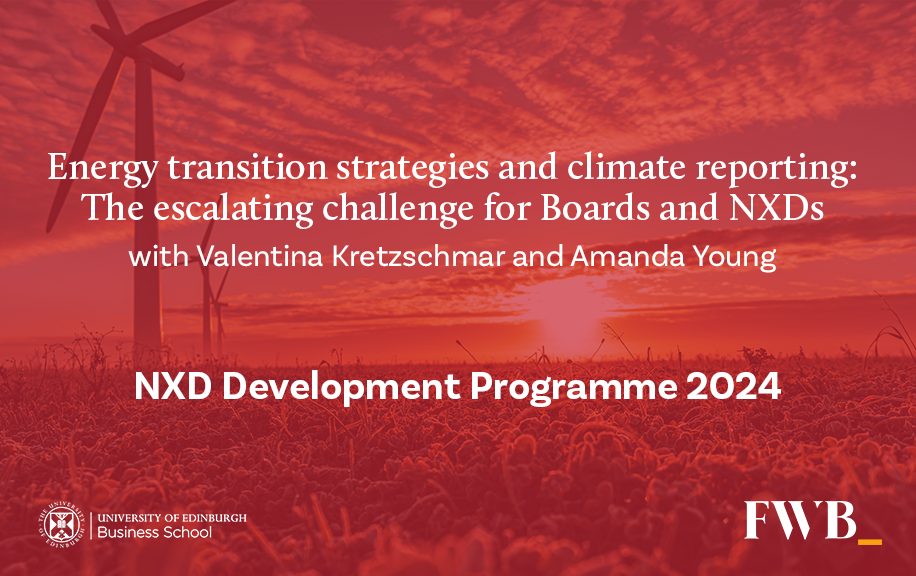Contact the team at FWB to discuss your individual or company requirements, or to discover more about our specialist services.
Navigating the Complexities of Private Equity
9 November 2024
- Leadership Development

Our Non-Executive Director Development Programme continued with a fourth session that deep-dived into the unique challenges and opportunities that non-executive directors (NXDs) face in private equity-backed businesses. Featuring insights from Calum Paterson of Scottish Equity Partners (SEP) and John Watson, the session highlighted the critical role of strategic alignment, effective communication, and ethical governance in driving value creation.
Calum Paterson
Since its inception, Calum has led SEP, a private capital fund management firm specialising in growth equity investments for software and technology-enabled businesses in the UK and across Europe. Over the last 25 years, SEP has backed more than 160 companies, working closely with their founders and management teams and using its knowledge, experience and extensive network to help them build their businesses and achieve their ambitions. He chairs its investment committee and works from the firm’s offices in London and Glasgow. He also works closely with SEP’s portfolio companies and was a member of the board of directors at Skyscanner, the Edinburgh-headquartered travel-technology company, before its £1.5 billion acquisition by Trip.com. Calum has been investing in high-growth companies since 1991. He trained as a Chartered Accountant with EY, has BA and MBA degrees from the University of Strathclyde in Glasgow and is a Fellow of the Royal Society of Edinburgh, Scotland’s national academy of science and learning. He is also a former Chair of the British Private Equity and Venture Capital Association (BVCA), the industry body and public policy advocate for private equity and venture capital in the UK.
John Watson
John has nearly 30 years of experience working with companies of all sizes. He joined Global Infrastructure Partners (GIP) as an Operating Principal in 2013 and Chief Commercial Officer of their investment, Edinburgh Airport Limited, and is currently CEO of Crosswind Developments Limited. GIP is an international infrastructure investment fund with assets in the energy, transport, digital, water and waste sectors. John works in the operational improvement team with a number of GIP investments worldwide. Before joining GIP, John was managing director of Lloyds Banking Group’s £50bn SME Lending portfolio and a founding board director of the Business Growth Fund plc. After qualifying as a Chartered Accountant with PwC Corporate Finance, John joined 3i plc. John is Chair of Intelligent Growth Solutions, Chair of FOR-EV, Senior Independent Director of Scottish Event Campus and NXD of Entrepreneurial Scotland Foundation. Formerly, John was Chair and NXD of the Institute of Directors and a member of the ICAS Governing Council.
Understanding Private Equity and the Role of NXDs
Calum Paterson kicked off the session by explaining the fundamentals of private equity, which focuses on companies with predictable cash flow and profitability, often leveraging debt to enhance returns. In contrast, venture capital deals with higher-risk startups. SEP, however, specialises in growth equity, taking minority stakes in scale-up companies without using debt, providing primary capital to drive growth and offering founders some liquidity.
Calum emphasised the importance of strong, effective boards in value creation. SEP drives value through strategic planning, execution, and leveraging networks to introduce experienced individuals to key functions. He highlighted the significance of appointing independent NXDs to bring unbiased judgement on strategy, performance, and resource allocation, which is crucial for governance and strategic engagement.
Board Composition and Dynamics
Typically, SEP’s boards include executive directors (CEO, CFO), independent NXDs, and an investment director from SEP. As businesses grow, the board structure evolves. Calum stressed the importance of cultural fit between executives and NXDs, especially in family-owned or closely controlled businesses. He also reminded that there is no legal distinction between executive and non-executive directors regarding responsibilities and liabilities, underscoring the need for due diligence before accepting appointments.
Looking ahead, Calum highlighted the increasing role of technology in the boardroom, particularly in risk management. He encouraged NXDs to be innovative and problem-solvers rather than passive recipients of information.
The Non-Executive Perspective in Private Equity
John Watson provided a non-executive perspective, discussing how private equity’s time-bound investment approach influences boardroom behaviour, with a strong focus on value creation and exit strategies. He noted that private equity investors often have a significant vested interest, detailed knowledge of the business, and a strong voice in board meetings.
John emphasised the importance of leadership, teamwork, expertise, and maturity for NXDs. Directors need to work as part of a team while bringing their individual expertise to the table. He discussed the inherent conflicts of interest for investor directors and the importance of managing these conflicts subtly to maintain effective board dynamics.
Practical Insights and Stakeholder Engagement
Both speakers stressed the importance of engaging with various stakeholders, including employees, communities, and government bodies, to drive sustainability initiatives. Open and transparent communication, both formally and informally, is crucial to address issues and build trust within the board.
Q&A Session Highlights
During the Q&A session, Calum emphasised the importance of building a dynamic from the beginning that encourages open and effective communication. This includes speaking to executive teams and independent directors outside of board meetings to ensure everyone can access the same information. He explained that investor directors must act in the company’s best interests despite inherent conflicts of interest, making the role of independent NXDs crucial for balanced and effective discussions.
John highlighted that private equity investors operate within a fixed timeframe, which influences their behaviour and the emphasis on value creation and exit strategies. He noted that private equity investors often have a significant vested interest and detailed knowledge of the business, which they bring to board meetings. Subtly managing conflicts of interest and maintaining open communication are key to effective board dynamics.
Key Takeaways
The session underscored the need for strategic alignment between the board, management, and investors to drive value creation. Addressing the complexities of private equity-backed businesses requires collaboration and effective communication among all stakeholders. Directors should balance short-term profits with long-term sustainability goals, maintaining a strong ethical compass. Continuous learning and adaptation are essential for boards to stay informed about industry developments and adapt their strategies accordingly.
These insights highlight the unique challenges and opportunities of being a non-executive director in a private equity-backed business and the critical role of effective board dynamics in driving success.
Our NXD Development Programme continues with the following sessions:
Session 6 (Thursday 21 November 2024, 6-8pm) – “The Effective Board”
Session 7 (Thursday 5 December 2024, 6pm-8pm) – an in-person event with Bob Brannan (DoubleTree Hilton, Edinburgh)
.
For details of the programme and to register for future sessions, please click here.
For enquiries, please email Laura at nxd@fwbltd.com.
This is the 7th year of the FWB / UEBS NXD Academy’s NXD Development Programme, which focuses on current challenges and opportunities that Boards are facing. Led by experienced Chairs and NXDs, it is aimed at those interested in all types and sizes of organisations: listed, private, entrepreneurial, SMEs, public sector and not-for-profit. Each session is interactive with small group activities, real-life case studies, plenary discussions, and Q&A. These sessions have been designed to allow plenty of time for interaction and active learning in all areas. Whilst each session has a main topic, the discussions and questions will be wide-ranging.




